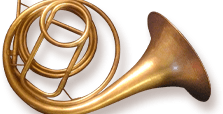Kleine Kammermusik - Baroque Virtuosity: Music by Zelenka, Dornel and Fasch
Geoffrey Burgess, oboe
Meg Owens, oboe
Stephanie Corwin, bassoon
Rebecca Humphrey Diederich, cello
Leon Schelhase, harpsichord
Experience the dazzling acrobatics of the baroque courts in music for oboes, bassoon and bass. This program travels through Paris and Dresden, featuring works by Jan Dismas Zelenka, Louis-Antoine Dornel, and Johann Friedrich Fasch.
AVLA HARMONIAE - Renaissance and Baroque Music from the Iberian Peninsula
Sang Joon Park , flauto traverso
Martha McGaughey, viola da gamba
Arthur Haas, harpsichord
AVLA HARMONIÆ explores Renaissance and Baroque music from the Iberian Peninsula written for our instruments. Composers presented will be Diego Ortiz (c.1510-c.1570), Antonio Correa Braga (fl. 17th Century), José Herrando (c.1720-1763), and Luis Misón (1727-1766).
Brooklyn Baroque with special guest Philip Anderson, tenor- Songs from Both Sides of the Pond
Rebecca Pechefsky, harpsichord
Philip Anderson, tenor
Andrew Bolotowsky,
David Bakamjian
Music by Thomas Arne, Charles Didbin, Henry Purcell, and Francis Hopkinson, one of the signers of the Declaration of independence.
Rebel - The Intimate Mozart: Works for Fortepiano, Violin, Viola & Violoncello
Jörg-Michael Schwarz, violin
Karen Marie Marmer, viola
John Moran, cello
Dongsok Shin, fortepiano
This program juxtaposes an obscure chamber work by Mozart (his d minor Adagio and Fugue for string trio) with one of his most celebrated chamber pieces, the quartet for fortepiano, violin, viola and cello in g minor, K 478.
The Sebastians – Over the Alps
Daniel S. Lee, violin
Ezra Seltzer, cello
Jeffrey Grossman, harpsichord
The critically-acclaimed period ensemble, the Sebastians, will perform a program of works by Biber, Corelli, Fontana, and Handel. The program will explore the emergence of the instrumental styles of 17th-century Italy and the adaptation of the Italian styles in 18th-century Austro-Germany.
Concitato, the ensemble scheduled for May 7, unfortunately had to cancel. We hope to present them in a future concert.
Juilliard415
Virtuoso Music of the German Baroque
Students from the distinguished graduate program in historical performance at The Juilliard School perform a selection of works ranging from the 1680s to the 1760s, in a colorful and extravagant mix of strings, winds, and continuo. Composers include Biber, Fasch, and Zelenka.
Program:
H.I.F. Biber (1644-1704)
Partita no. 3 in A major, from Harmonia Artificiosa-Ariosa (Salzburg, 1696) 14min’
Preludium: Allegro — Allamande — Amener — Balletto — Gigue — Ciacona
Nayeon Kim & Toma Iliev, violins
Alexander Nicholls, cello
Gabriel Benton, harpsichord
Paul Morton, theorbo
Johann Friedrich Fasch (1688-1758)
Sonata for Violin, Oboe, Bassoon and Continuo, FaWV N:F4 10 min’
Largo – Allegro – Largo - Allegro
Carrie Krause, violin
Caroline Ross, oboe
Kamila Marcinkowska-Prasad, bassoon
Gabriel Benton, harpsichord
J.D. Zelenka (1679-1745)
Trio Sonata no. 3 for violin, oboe, bassoon and Basso Continuo in B flat major 14 min’
Adagio – Allegro – Largo - Tempo giusto (Allegro)
Nayeon Kim, violin
David Dickey, oboe
Benjamin Matus, bassoon
Melody Nishinaga, harpsichord
Artemis Baroque - Works for Flutes and Voice
Melissa Baker & Sandy Miller, Flutes
Melissa Attebury, Voice
Janet Yieh, Harpsichord
Artemis Baroque represents the philosophy that one's instrument is simply an extension of the human voice. This concert will explore the similarities of voice and flute: in both timbre, expression, and performance pracitice - especially within the baroque era.
VocaMe – Mystic Women
Sarah M. Newman, soprano and vielle
Gerlinde Sämann, soprano
Sigrid Hausen, mezzo-soprano and recorder
Petra Noskaiová, mezzo-soprano
Michael Popp, vielle, oud, santur
Worldwide, VocaMe is the only ensemble to dedicate themselves on a grand scale to the works of the earliest female composer: the works of Saint Kassia of the Byzantine Empire from the 9th Century. These works will be coupled with the chants by the well known German mystic of the 12th Century, Hildegard von Bingen. On the occasion of her canonization by the Catholic Church in 2012, Berlin Classics/Edel Records has released a sensational and exciting recording of Hildegard von Bingen's beautiful chants. Presented side by side, listeners can hear the fascinating differences and similarities between the music and texts of these two women.
Jude Ziliak - I come to the garden alone: German music for solo violin
Violin
"Choice flowers ... of charming rarity:" so Handel described the contents of his gift to Telemann in 1754. So too might we describe this assortment of (mostly) German works for solo violin, by Telemann, Bach, Vilsmayr, and Montanari. This program begins with disorderly, manic virtuosity from Montanari. It moves on to the civilized and touching music of Telemann, a rhapsody from Biber's little-known student Vilsmayr, and finally Bach's all-encompassing Ciaccona.
Mario Aschauer – Muffat Unheard
Harpsichord
The program features keyboard works by Georg Muffat. Until recently only the pieces in A-Wm 743 and the printed collection "Aparatus musico-organisticus" were known. Among the restituted manuscripts from the Berlin Singakademie archives a new collection of six suites in Gottlieb Muffat's hand was found, of which at least five are by his father.
Special one time performance at Immanuel Lutheran Church, 122 E. 88th St. New York, NY 10128
ARTEK – Salvator Mundi: Music in the Time of Bernini
Counter-Tenor, violins, violone, theorbo, organ
Sacred music from Stradella and others in the artistic circles of Bernini and Queen Christina in 17th-century Rome. Featuring Eric Brenner & Ryland Angel, countertenors.
The Pez Dispensers – Duplex Genius
Adriane Post, violin
Beth Wenstrom, violin
Kivie Cahn-Lipman, cello and viola da gamba
Simon Martyn-Ellis, theorbo and guitar
Elliot Figg, harpsichord
Six sonatas from Duplex Genius- Johann Christoph Pez, wrote twelve sonatas for two violins, obligato bass instrument, and basso continuo, entitled Duplex Genius. The collection was recently published, but has not yet been recorded and has not yet been performed.
Dryden Ensemble - Mozart, Haydn & J. C. Bach
Ryland Angel, tenor
Jane McKinley, classical oboe
Vita Wallace, violin
Andrea Andros, viola
Lisa Terry, cello
Dongsok Shin, fortepiano
The program includes works by three masters of the classical period: a quartet for oboe, strings, and continuo by J. C. Bach, the Larghetto from Mozart's Quintet in E-flat, K. 452, arranged for oboe, strings, and fortepiano, and Haydn's settings of three Scottish songs for tenor and piano trio.
Mr. Jones and the Engines of Destruction - Lelio Colista: Rome's True Orpheus
Daniel Swenberg, theorbo/lute
Adriane Post, violin
Johanna Novom, violin
Gwen Toth-organ, harpsichord
Trio sonatas from the most influential Roman composer of this genre -- pre-Corelli. Lelio Colista was one of Purcell's "famed Italian masters" and was a major influence on Corelli-- he also hired the young Corelli for oratorios. Lelio was also Gaspar Sanz's guitar teacher. A Kircher referred to him as Rome's true Orpheus. Today, however, his music is seldom performed/ known. Mr. Jones and the Engines of Destruction perform a few of his trio sonatas, in the manner he would have (without bowed bass), and alternate them with his guitar solos and lute works of his colleagues.
ALBA – Earthy Love, Divine Love
Margo Gezairlian Grib, Mezzo-Soprano, Vielle
Christopher Morongiello, Lute, Guitarra Española
Carlo Valte, Oud
Rex Benincasa, Percussion, Voice
ALBA Consort presents secular songs of joy, lamentation and wonder:
A rich palate of Middle Eastern and European love songs including romantic French virelai, lively Spanish villancico, tender Armenian folk song, Italian devotional song of divine mystery, and Arabic indulgence where physical and spiritual love entwine.
Anima - “I laughed, I cried…” Music of the Prime Donne Innamorate in 17th century Italy
Beth Anne Hatton, soprano
Vita Wallace, Baroque violin and lira da braccio;
Christa Patton, harp
Motomi Igarashi, viola da gamba and lirone.
The commedia dell' arte character known as Isabella was a 'prima donna innamorata' -- an educated, articulate, chaste and cultivated woman. Anima explores the legacy of her creator, the reknowned actress, poet and intellectual Isabella Andreini in this program of theatrical music.
Trio Pasqualati – Clementi and Beethoven
Yi Heng yang, fortepiano
Theresa Salomon, violin
Lindy Clarke, violoncello
Clementi and Beethoven, of seemingly very dissimilar character, had links throughout their lives. Beethoven admired Clementi's work as composer and virtuoso. A volume of Clementi's piano sonatas was always at hand and he is said to have performed them frequently. Clementi, on the other hand was Beethoven's publisher in England were he lived after leaving Italy as a teenager. (He also had a business as piano dealer in London, being a jack of many trades). The two trios, although published around the same time speak very different languages, Clementi's elegant and classical, Beethoven's daring and unsettling.
The Eurasia Consort - Early Music Along the Silk Road
Tomoko Sugawara; Kugo and Gothic Harp
August Denhard; Plectrum Lute, Oud
Danny Mallon; Percussion
This program imagines what music travelers on the Silk Road might have heard between 500 and 1500 AD. It had become a conduit of silk, music, Buddhism, etc. Versions of the instruments played here – harp, lute and percussion – had originated in western Asia and traveled to eastern Asia along the road.
Grand Harmonie – Early Romantic Music for Brass, works of Cherubini, Dauprat and others
Horns, Trompette Demilune, trombone
Join Grand Harmonie for an exciting program of rarely performed works for brass performed on the instruments they were originally intended for! Our concert will feature music by Luigi Cherubini, Sigismund Ritter von Neukomm, and Louis-François Dauprat in works for mixed brass ensemble.
Galileo’s Daughters – Music for Copernicus
Sarah Pillow, soprano
Mary Anne Ballard, viola da gamba
with guests: James Waldo and John Mark Rozendaal, viola da gamba
Music for Copernicus is a program of 15th and 16th century music celebrating the life of astronomer and mathematician Nicolaus Copernicus.
Dorian Baroque - The Curious Case of the Sonata: Instrumental Inventions of Italy in the 17th Century
Marina Fragoulis, baroque violin
Margalit Cantor, baroque cello
Magdalena Baczewska, harpsichord
The earliest sonatas appeared in the early 1600s when musical developments in notation and the popular use of the printing press compelled composers to experiment increasingly with instrumental music. These sonatas are some of the earliest known instrumental works that explore musical thought with no obligation to text, whose bare bones notation allowed the performers the freedom to improvise, embellish and ornament. The music is vividly rhetorical, characterized by unpredictable shifts in mood, contrasting dynamics and short irregular phrases meant to leave the listener stirred and unsettled. Music by Pandolfi, Castello, Marini, Fontana and Bertali.



